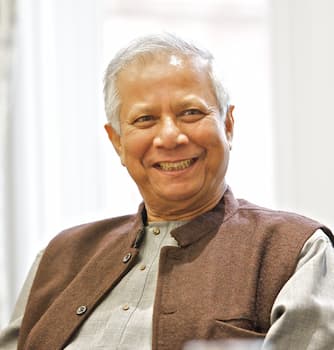Muhammad Yunus Bio | Wiki
Muhammad Yunus is a Bangladeshi social entrepreneur, banker, economist, and civil society leader. He was awarded the Nobel Peace Prize for founding the Grameen Bank and pioneering the concepts of microcredit and microfinance. These loans are given to entrepreneurs too poor to qualify for traditional bank loans.
Yunus has received several other national and international honors. He received the United States Presidential Medal of Freedom in 2009 and the Congressional Gold Medal in 2010. In 2008, Yunus became rated number 2 in Foreign Policy magazine’s list of the ‘Top 100 Global Thinkers’. In 2012, he became Chancellor of Glasgow Caledonian University in Scotland, a position he held until 2018.
Muhammad Yunus Age
Yunus was born on June 28, 1940, in Bangladesh. He is 81 years old.
Muhammad Yunus Height
He is a man of average stature and stands at a height of 5 ft 7 in (Approx. 70 m).

Muhammad Yunus Family
He was born in the village of Bathua, in the Bengal Presidency of the British Raj, present Bangladesh. Yunus’s parents are Hazi Dula Mia Shoudagar and Sufia Khatun, while his siblings include Jahangir. Yunus became raised as the third of nine children in a Bengali Muslim family. His father was a jeweler. In 1944, his family moved to the city of Chittagong.
Muhammad Yunus Wife
Yunus married his wife Afrozi Yunus, a professor of physics at Jahangirnagar University. Together, the couple shares a daughter Deena Afroz Yunus who was born in 1986. Previously, Yunus married Vera Forostenko in 1970 who he met at Vanderbilt University.
However, their marriage ended within months of the birth of their daughter, Monica Yunus, in 1979 in Chittagong. Vera returned to New Jersey claiming that Bangladesh was not a good place to raise a baby. Monica became an operatic soprano based in New York City.
Muhammad Yunus Education
He attended Lamabazar Primary School in Chittagong. Later, Yunus passed the matriculation examination from Chittagong Collegiate School ranking 16th of 39,000 students in East Pakistan. During his school years, he was an active Boy Scout and traveled to West Pakistan and India in 1952, and to Canada in 1955 to attend Jamborees. In 1957, he enrolled in the Department of Economics at Dhaka University and completed his BA in 1960 and MA in 1961.
Muhammad Yunus Grameen Bank
In December 1976, Yunus secured a loan from the government Janata Bank to lend to the poor in Jobra. The institution continued to operate, securing loans from other banks for its projects. By 1982, it had 28,000 members. On October 1, 1983, the pilot project started operation as a full-fledged bank for poor Bangladeshis and became renamed Grameen Bank
Yunus and the Grameen Bank were jointly awarded the Nobel Peace Prize “for their efforts through microcredit to create economic and social development from below”. The Norwegian Nobel Committee said that
“lasting peace cannot be achieved unless large population groups find ways in which to break out of poverty” and that “across cultures and civilizations, Yunus and Grameen Bank have shown that even the poorest of the poor can work to bring about their own development“.
Muhammad Yunus Is Renowned For
He became renowned for receiving the Nobel Peace Prize for founding the Grameen Bank and pioneering the concepts of microcredit and microfinance. Yunus has received several other national and international honors. He received the United States Presidential Medal of Freedom in 2009 and the Congressional Gold Medal in 2010.
Muhammad Yunus Books
He published several books related to his finance work. They include:
(1974). Three Farmers of Jobra
(2017). A World of Three Zeroes
(2010). Building Social Business
(2007). Creating a World without Poverty
(1999). Banker to the Poo
(1976). Planning in Bangladesh
Muhammad Yunus Net Worth
He earns his wealth from his career, therefore, he has amassed a fortune over the years. Yunus’ estimated net worth is $10 million.
Who Is Muhammad Yunus
Yunus is a Bangladeshi social entrepreneur, banker, economist, and civil society leader. He became awarded the Nobel Peace Prize for founding the Grameen Bank and pioneering the concepts of microcredit and microfinance. These loans are given to entrepreneurs too poor to qualify for traditional bank loans.